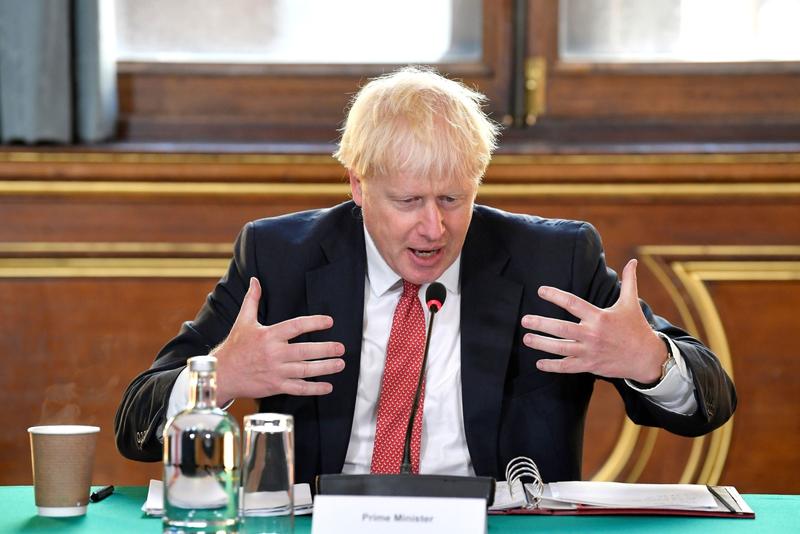 Britain's Prime Minister Boris Johnson speaks during a Cabinet meeting of senior government ministers at the Foreign and Commonwealth Office (FCO) on Sept 1, 2020 in London, England. (TOBY MELVILLE - WPA POOL / GETTY IMAGES / BLOOMBERG)
Britain's Prime Minister Boris Johnson speaks during a Cabinet meeting of senior government ministers at the Foreign and Commonwealth Office (FCO) on Sept 1, 2020 in London, England. (TOBY MELVILLE - WPA POOL / GETTY IMAGES / BLOOMBERG)
MEXICO CITY / WASHINGTON / HAVANA / BRASILIA / BOGOTA / LONDON / MADRID / PARIS / BERLIN / HARARE / BUDAPEST / KIEV / MOSCOW / ATHENS - Boris Johnson’s government announced another U-turn on Wednesday, caving in to pressure from opponents and keeping local lockdown rules in place amid a rise in COVID-19 cases.
The prime minister is pushing to get Britons back to work and school, and his team had decided restrictions imposed in some areas of northwest England should be eased. But local politicians, including Greater Manchester’s mayor, Andy Burnham, condemned the plan and warned infections were rising again.
Five hours after Burnham intervened, Johnson’s Health Secretary Matt Hancock announced the policy would be reversed.
“Following a significant change in the level of infection rates over the last few days, a decision has been taken that Bolton and Trafford will now remain under existing restrictions,” Hancock said Wednesday in an email. “This decision has been made in collaboration with local leaders after reviewing the latest data.”
With the UK economy in a deep recession, Johnson is determined to avoid another national lockdown and has promised instead to target local areas where COVID-19 infections flare up, allowing daily life to carry on elsewhere. The latest reversal is a blow to the credibility of Johnson’s strategy and will add to the impression that his government is not in control.
The UK recorded 1,295 daily confirmed cases of COVID-19, according to government data published on Tuesday, down from 1,406 a day earlier and pushing the tally to 337,168.
Three people died within 28 days of testing positive for the disease, the daily statistics release said, bringing the death toll under that measure to 41,504.
 In this Jan 26, 2017 photo, then candidate to the post of Director-General of the World Health Organization (WHO), David Nabarro, gestures during a press conference in Geneva. (FABRICE COFFRINI / AFP)
In this Jan 26, 2017 photo, then candidate to the post of Director-General of the World Health Organization (WHO), David Nabarro, gestures during a press conference in Geneva. (FABRICE COFFRINI / AFP)
WHO
A World Health Organization (WHO) special envoy on COVID-19 has issued a clarification of comments made in a radio interview that were interpreted by many as an endorsement of Sweden’s soft lockdown.
“I make a point of not making specific comparisons between national responses,” David Nabarro said in a statement that followed a radio interview in New Zealand, which imposed strict measures against the coronavirus. “I encourage all nations to adopt comprehensive prevention and containment strategies.”
During the interview, with Magic Talk radio, Nabarro discussed the different responses in Sweden and New Zealand and said that widespread restrictions on people’s movements “really bite into the livelihoods of everybody.”
New Zealand’s recent decision to reimpose a lockdown in Auckland was the right one, he said. “Because the origins of cases are unclear, it’s right that there is strong action,” he said.
The WHO tends to avoid direct criticism of countries’ health policies.
Unlike much of Europe, Sweden avoided a general lockdown, relying largely on voluntary measures to curb human interactions where the virus could spread. “The government was able to trust the public and the public was able to trust the government,” Nabarro said.
But he also said there’s “still a lot to be worked at from aspects of the Swedish response.”
ALSO READ: Sweden launches commission to investigate coronavirus response
The Nordic nation’s COVID-19 death rate remains considerably higher than in many other countries, at about 57 per 100,000.
A total of 84,521 confirmed cases and 5,813 deaths had been reported in the country, according to a tally by Johns Hopkins University.
Corticosteroid drugs
Treating critically ill COVID-19 patients with corticosteroid drugs reduces the risk of death by 20 percent, an analysis of seven international trials found on Wednesday, prompting the World Health Organisation to update its advice on treatment.
The analysis - which pooled data from separate trials of low dose hydrocortisone, dexamethasone and methylprednisolone - found that steroids improve survival rates of COVID-19 patients sick enough to be in intensive care in hospital.
“This is equivalent to around 68 percent of (the sickest COVID-19) patients surviving after treatment with corticosteroids, compared to around 60 percent surviving in the absence of corticosteroids,” the researchers said in a statement.
“Steroids are a cheap and readily available medication, and our analysis has confirmed that they are effective in reducing deaths amongst the people most severely affected by COVID-19,” Jonathan Sterne, a professor of medical statistics and epidemiology at Britain’s Bristol University who worked on the analysis, told the briefing.
He said the trials - conducted by researchers in Britain, Brazil, Canada, China, France, Spain, and the United States - gave a consistent message throughout, showing the drugs were beneficial in the sickest patients regardless of age or sex or how long patients had been ill.
The findings, published in the Journal of the American Medical Association, reinforce results that were hailed as a major breakthrough and announced in June, when dexamethasone became the first drug shown to be able to reduce death rates among severely sick COVID-19 patients.
Dexamethasone has been in widespread use in intensive care wards treating COVID-19 patients in some countries since then.
Global tally
Coronavirus cases worldwide on Wednesday surpassed 25.7 million while the global death toll topped 857,000, according to the Center for Systems Science and Engineering (CSSE) at Johns Hopkins University.
Africa tally
The Africa Centers for Disease Control and Prevention (Africa CDC) on Tuesday said that Africa's COVID-19 death toll has risen to 29,833 while the number of infections reached 1,252,552.
South Africa alone accounts for about 50 percent of all COVID-19 infections in the continent, followed by Egypt, which has close to eight percent of all COVID-19 infections in the continent, the Africa CDC said.
Google, Apple roll out built-in COVID-19 exposure notifications
Alphabet Inc's Google and Apple Inc on Tuesday announced a new system that will enable public health authorities to use smartphones to assist in contact tracing without having to build an app.
The new system - called Exposure Notifications Express - will allow public health officials to submit a small configuration file to Apple and Google. The two tech companies will then use the file to set up systems that phone owners can opt in to in order to determine whether they have been near someone who has tested positive for the novel coronavirus.
In the case of iPhones, a new version of the iOS operating system being released on Tuesday will alert users whether an exposure notification system is available from local health authorities and allow users to set it up without downloading any new apps. On Android devices, users will also get a prompt from the phone's operating system, but will still have to download an automatically generated app.
The two companies said Maryland, Nevada, Virginia, and Washington, D.C., will be the first US places to use the new system. The new system also works alongside tools that the two companies released in May that enable public health officials to build apps that allow iPhones and Android devices to use Bluetooth signals to detect proximity to a person who has tested positive.
Study: Mothers-to-be more at risk of intensive care admission
Mothers-to-be with COVID-19 may be at increased risk of intensive care admission, breathing problems that require the use of a ventilator and giving birth early, researchers said.
Babies born to mothers with the pandemic virus were also at higher risk of needing intensive care, with a quarter admitted to the neonatal unit, according to an analysis that was published in the BMJ medical journal and partly funded by the World Health Organization (WHO). However, still birth and newborn death rates were low among these babies, the researchers found.
The researchers analyzed 77 studies that included 11,432 hospitalized pregnant and recently pregnant women with suspected or confirmed coronavirus infections.
About one in 10 pregnant or recently pregnant women who were admitted to a hospital for any reason were diagnosed or suspected to have COVID-19, the researchers found, although rates varied from study to study. These patients were less likely to report symptoms of fever and muscle pain than non-pregnant women with the disease, according to researchers led by Shakila Thangaratinam of the WHO Collaborating Center for Global Women’s Health and the UK’s University of Birmingham.
Older mothers and those with underlying medical conditions such as diabetes, high blood pressure and being overweight were most likely to have severe cases of COVID-19, they said.
Albania
Albania's health ministry is planning to increase epidemiological field teams prior to the new school year in an effort to limit the spread of COVID-19, Minister of Health and Social Protection Ogerta Manastirliu said on Tuesday.
"We have increased epidemiological field teams by 30 percent, from 54 to 70 teams," Manastirliu said during a meeting with epidemiologists.
The Ministry of Education has announced that the new school year will start on Sept 14 under strict health measures.
On Tuesday, health authorities reported 93 new coronavirus cases in the last 24 hours, bringing the tally to 9,606, with 5,441 recoveries and 290 fatalities.
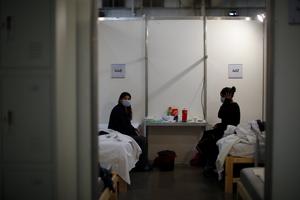 COVID-19 patients rest at Tecnopolis Park, which has been repurposed as a shelter to quarantine those who are asymptomatic or have light symptoms, in Buenos Aires, Argentina, Sept. 1, 2020. (NATACHA PISARENKO / AP)
COVID-19 patients rest at Tecnopolis Park, which has been repurposed as a shelter to quarantine those who are asymptomatic or have light symptoms, in Buenos Aires, Argentina, Sept. 1, 2020. (NATACHA PISARENKO / AP)
Argentina
After more than five months of strict lockdowns, Argentina’s coronavirus crisis is only getting worse: Almost 47 percent of people tested get a positive result back.
The World Health Organization (WHO) suggests nations push the rate below 5 percent for several weeks before reopening their economies.
Argentina passed Chile to claim the 10th spot in most cases globally, with 417,735 infections and 8,730 confirmed deaths.
Over the past week alone, cases have risen 9.9 percent, the most among the top 20 countries.
Brazil
Brazil reported 42,659 new cases of the novel coronavirus and 1,215 deaths from COVID-19, the disease caused by the virus, in the past 24 hours, the health ministry said on Tuesday.
Brazil has registered 3,950,931 cases of the virus since the pandemic began, while the official death toll from COVID-19 has risen to 122,596, according to ministry data, in the world's worst coronavirus outbreak outside the United States.
Colombia
Confirmed deaths in Colombia due to COVID-19 topped 20,000 on Tuesday as cases surpassed 624,000, the health ministry said in its daily update.
The Andean country has so far reported 20,052 deaths and 624,069 cases of the novel coronavirus. Active cases stand at 133,155.
Colombia ended its initial quarantine measures this week after nearly five months of national lockdowns.
Colombia is now in a phase of selective quarantine, the government has said. Restrictions on events and large crowds will continue this month while the government evaluates the spread of the virus, as more economic activity resumes with safety protocols in place.
The country's aviation sector reopened on Tuesday, with the resumption of several local flights, while intermunicipal transport also resumed operations in some regions with necessary biosecurity measures.
Croatia
The presidency of the Croatian Parliament on Tuesday passed a decision that its members (MPs) will have to wear masks at all parliamentary sessions, given the current epidemiological situation of COVID-19.
According to the Croatian Institute of Public Health, 145 new COVID-19 cases were reported in the last 24 hours, bringing the tally to 10,414. There were still 2,492 active cases.
It was also decided that during parliament sessions, there will be a smaller number of MPs in the main hall, a maximum of 41 out of the total of 151 seats, and voting will take place in more halls.
After Tuesday's session of the parliamentary presidency, Speaker of the Croatian Parliament Gordan Jandrokovic told reporteres that electronic voting would be possible, which would enable MPs who are ill or in self-isolation to vote.
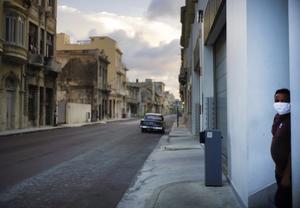 A man wearing a face mask as a precaution against the spread of the new coronavirus stands at a door frame next to an empty street during a curfew in Havana, Cuba, Sept 1, 2020. (RAMON ESPINOSA / AP)
A man wearing a face mask as a precaution against the spread of the new coronavirus stands at a door frame next to an empty street during a curfew in Havana, Cuba, Sept 1, 2020. (RAMON ESPINOSA / AP)
Cuba
Pupils returned to school throughout much of Cuba on Tuesday after more than five months, although not in Havana where restrictions including a curfew went into effect due to a surge in coronavirus infections.
Authorities deemed the coronavirus outbreak contained enough in most of the island to be able to restart classes as long as pupils wear face masks, disinfect their hands upon arrival at school and sit at physically distanced desks. In Havana and municipalities in four other provinces, classes will be held online until coronavirus outbreaks are under control.
Cuba, with 11 million inhabitants, has reported over 4,000 cases and 95 deaths from COVID-19.
For the first time since March, a curfew was imposed on Tuesday in the capital, requiring residents to stay off the streets from 7 pm to 5 am.
Egypt
Egypt reported on Tuesday 176 new COVID-19 cases, bringing the total number of infections in the country to 99,115 the health ministry said in a statement.
The death toll rose by 19 to 5,440 while recoveries increased by 899 to 73,828, according to the ministry.
Finland
The number of downloads for the Finnish COVID-19 tracking app topped one million in 24 hours after it was released, the Finnish Institute for Health and Welfare (THL) said Tuesday in a press release.
The larger the number of users, the faster and more confidently the chains of infection can be quickly broken and keep the epidemic under control, explained Mika Salminen, director of Health Security at THL.
The app speeds up reaching those exposed to the virus and cutting off infection chain, said THL.
According to THL, as of Tuesday afternoon, Finland has confirmed 8,142 COVID-19 infections, including 56 fresh cases. The death toll stood at 336 while an estimated 7,200 people have recovered.
France
The French health ministry reported 4,982 newly confirmed coronavirus cases on Tuesday, up from 3,082 registered on Monday but below the highs of nearly 7,400 seen last week.
The number of people who have died from COVID-19 infections increased by 26 to 30,661 in all, and the cumulative number of COVID-19 cases now totals 286,007.
Ministry data showed that the rise in infections was due not just to more tests being done but also to a higher rate of positive tests, now at 4.3 percent, compared to 3 percent in mid-August and 1.5 percentat the end of July.
The number of people in hospitals rose by 22 to 4,604 on Tuesday, a third consecutive daily increase. The number of people in intensive care units also rose again by 15 to 424, the fifth consecutive increase.
Also on Tuesday, more than 12 million French children returned to school after having been out of class for more than five months because of the lockdown and summer holidays.
Georgia
Georgia confirmed 38 new COVID-19 cases on Wednesday, a record high since April 16, pushing its tally to 1,548.
Twenty of the new cases came from Georgia's Black Sea resort town of Batumi, another seven were contacts of infected individuals, four were imported, while the remaining five were untraceable, according to the country's centre for disease control.
A total of 1,270 patients have recovered while 19 others have died, the center said.
Germany
The number of confirmed coronavirus cases in Germany increased by 1,256 to 244,855, data from the Robert Koch Institute (RKI) for infectious diseases showed on Wednesday.
The reported death toll rose by eleven to 9,313, the tally showed.
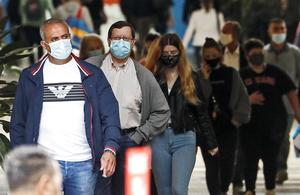 People wearing face masks walking at a shopping center in Essen, Germany, Sept 1, 2020. (MARTIN MEISSNER / AP)
People wearing face masks walking at a shopping center in Essen, Germany, Sept 1, 2020. (MARTIN MEISSNER / AP)
Greece
Greece recorded its first coronavirus case in the overcrowded migrant camp of Moria on the island of Lesbos, two migration ministry officials said on Wednesday.
A 40-year old asylum seeker has tested positive for the virus and had been put in isolation, one of the officials told Reuters. Authorities were trying to trace the people he had contacted, the official said.
The Moria facility, which hosts about 13,000 people, has been frequently criticized by aid groups for poor living conditions.
Since March 1, all migrants who reach Lesbos have been quarantined away from the island’s camps.
Greece has so far recorded 10,524 COVID-19 cases and 271 related deaths.
In recent weeks it has seen a surge in cases, which has forced Greek authorities to gradually reimpose restrictions to curb the spread of the virus.
Hungary
Hungary said on Wednesday it had registered 365 new COVID-19 infections, its highest daily tally on record, as people return from summer holidays and the school year starts up.
The total number of cases, as of Wednesday, stood at 6,622, with 619 deaths.
While most people with the disease have recovered, the number of active cases has risen over the past week or so from the hundreds to 2,100 on Wednesday, and experts have warned of a spike in infections in coming weeks as schools reopen.
Libya
The National Center for Disease Control of Libya on Tuesday reported 658 new COVID-19 cases, the highest daily increase in the country so far.
The center said in a statement that the tally has risen to 14,624, including 1,676 recoveries and 242 deaths, after 217 new recoveries and five more deaths were recorded.
 A woman sits at a table in a restaurant as waiters wearing masks and face shields stand at the back, in Mexico, on Sept 1, 2020. (REBECCA BLACKWELL / AP)
A woman sits at a table in a restaurant as waiters wearing masks and face shields stand at the back, in Mexico, on Sept 1, 2020. (REBECCA BLACKWELL / AP)
Mexico
Mexico's health ministry on Tuesday reported 6,476 new confirmed cases of coronavirus infections and 827 additional fatalities, bringing the total in the country to 606,036 cases and 65,241 deaths.
The government has said the real number of infected people is likely significantly higher than the confirmed cases.
Earlier in the day, President Andres Manuel Lopez Obrador defended his handling of the economic fallout from the pandemic, arguing in a major speech that the economy has fared better than some of its peers.
The pandemic lockdown threw Mexico's economy, Latin America's second largest, into the deepest slump since the Great Depression, shrinking 17 percent in the second quarter.
"The economy's contraction, despite the global disaster, was 10.4 percent during the first half of the year. But despite the collapse the damage was smaller than in Italy, Spain, France and the United Kingdom," Lopez Obrador said in his state of the union address from the ornate national palace.
"We have faced the pandemic and we are going to get out of the economic crisis without taking on additional external debt and without allocating public money to immoral bailouts," he said.
Mexico's central bank has warned the economy could contract by almost 13 percent this year.
ALSO READ: WB: Latin America heading for deepest slump since at least 1901
Morocco
Morocco registered 1,191 new COVID-19 cases on Tuesday, raising the tally of infections in the North African country to 63,781, the health ministry said.
Total recoveries increased by 1,327 to 48,922 while the death toll rose by 43 to 1,184, said Mouad Mrabet, coordinator of the Moroccan Center for Public Health Operations at the Ministry of Health, at a press briefing.
Portugal
As coronavirus cases in Portugal go up and down, fears are growing that Britain will reimpose a quarantine for people travelling from the country.
It has been less than two weeks since Britain, Portugal's leading source of tourism, lifted a 14-day self-isolation rule for travellers arriving from Portugal.
The number of passengers arriving from Britain has grown by a whopping 190 percent since Portugal was removed from Britain's quarantine list.
But a steady count of several hundred new cases per day over the last week raised fears Britain would put Portugal back on the list.
Last Thursday, health authorities reported 401 new infections, the highest since early July. Cases have since dropped, with 231 on Tuesday, bringing the total to 58,243.
British media reports said the number of daily cases in Portugal meant it may be forced back on to the quarantine list.
Russia
Russia reported 4,952 new coronavirus cases on Wednesday, pushing its national tally to 1,005,000, the fourth largest in the world.
Authorities said 115 people had died in the last 24 hours, bringing the official death toll to 17,414.
Spain
Spain's health ministry said on Tuesday the number of coronavirus cases detected daily had declined over the past four days, further off a peak of around 10,000 reached about 10 days ago, and officials said no new lockdown was necessary.
The country diagnosed 2,731 infections in the past 24 hours, but these data could be revised in future as Spain updates its statistics retroactively. Tuesday's update raised the tally by 8,115 cases to 470,973 overall, more than any other western European nation.
The latest data showed 159 deaths were registered in the past seven days, bringing the death toll to 29,152.
Spanish Prime Minister Pedro Sanchez expressed his concern over the spread of the coronavirus, but said that it was safe for children to return to school in the coming days.
"From a public health perspective the current situation does not call for a new lockdown," Health Minister Salvador Illa said on Onda Cero radio. "If we do things right, if we follow the recommendations of experts, it won't be necessary."
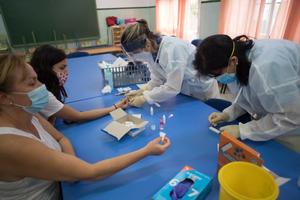 Healthcare workers take blood samples from teachers as staff at the Miguel de Cervantes school undergo PCR tests ahead of its reopening for a new academic year amid the coronavirus pandemic, in Ronda, Spain, Sept 1, 2020. (JORGE GUERRERO / AFP)
Healthcare workers take blood samples from teachers as staff at the Miguel de Cervantes school undergo PCR tests ahead of its reopening for a new academic year amid the coronavirus pandemic, in Ronda, Spain, Sept 1, 2020. (JORGE GUERRERO / AFP)
READ MORE: UK to ramp up return-to-workplace drive after virus slump
Ukraine
Ukraine registered a record 2,495 new coronavirus cases and 51 related deaths in the past 24 hours, the national security council said on Wednesday.
Ukraine has imposed a temporary ban on most foreigners entering the country until Sept 28 and extended lockdown measures until the end of October to contain a recent spike in cases.
Ukrainian Prime Minister Denys Shmygal said this week the government predicted the number of new coronavirus cases would continue to rise there in September and could reach 3,000 a day by the end of this month.
The country has so far reported a total of 125,798 infections and 2,656 deaths.
Uruguay
The Uruguayan government signed on Tuesday an agreement with Brazil on jointly monitoring COVID-19 in the border cities of Artigas and Rio Branco in Uruguay, and Quarai and Jaguarao in Brazil.
With the agreement, those border cities will be approached as "health units." Criteria on diagnostic methods and preventive measures, such as the use of face masks, social distancing, and shop capacity, will be unified to control possible outbreaks.
Such measures have already been applied on a pilot basis in the Uruguayan city Rivera and the Brazilian city Livramento, which are separated by only one avenue.
US
New case counts are declining in some recent hot spots in the US. But they’re spiking in places like Iowa and South Dakota, signaling what may be a new phase in the country’s virus fight as progress in one state is repeatedly offset by infections in others, with little improvement overall.
Politics plays a role, as do events like college reopenings and the Sturgis motorcycle rally. But it’s also a sign of fatigue, the frustration and exhaustion Americans feel after months of masks and hand sanitizer, social isolation, shuttered businesses and closed beaches.
Overall, US cases this week surpassed 6 million. In the Midwest, positivity rates have reached alarming levels.
In Iowa, for instance, 10.3 percent of cases came back positive on Monday, slightly below the 14-day average of 11.1 percent, according to state data. Overall, the state, which currently has no state-wide mask mandate, has recorded 65,478 cases, with new cases rising 50 percent in the last two weeks.
Iowa State University, in Ames, reported Monday that 28.8 percent of the students, faculty and staff tested in the most recent week had the virus, although school officials have focused their testing on people showing symptoms or those who have been exposed to someone with the virus. The University of Iowa has reported 922 cases within its campus population.
In Ohio, COVID-19 first started as an urban scourge in the cities of Cleveland and Columbus. But the spread is now making waves in rural regions spurred by social gatherings and the return to school, Ohio Governor Mike DeWine said Tuesday during a news conference in Cedarville.
“The virus is not going away,” DeWine, a Republican, said. “We think a significant part of this is caused by our colleges going back as well as our grade schools going back.”
A panel of experts convened by the National Institutes of Health undercut an emergency authorization issued just days ago by the US Food and Drug Administration (FDA), saying there’s not enough evidence to recommend use of convalescent plasma for hospitalized coronavirus patients.
The NIH advisers said an analysis of a study showed no difference in seven-day survival among those who received plasma containing high amounts of antibodies. The statement contradicts inflated claims made at a White House press conference a week ago, where FDA Commissioner Stephen Hahn and President Donald Trump said convalescent plasma could cut deaths from the virus by 35 percent. Hahn subsequently apologized for mischaracterizing the benefits of the therapy.
Coronavirus cases in the US on Tuesday surpassed 6.07 million while deaths topped 184,000, according to a tally by Johns Hopkins University.
READ MORE: US orders up to 600m doses of Pfizer, BioNTech vaccine
Zimbabwe
Zimbabwe will reopen primary and secondary schools this month for students preparing to sit their final exams, six months after they were closed due to the COVID-19 outbreak, the government said on Tuesday.
The first students to return, on Sept 14, will be those taking Cambridge International exams. Those taking locally administered final exams will go back two weeks later.
Zimbabwe has recorded about 6,500 cases of COVID-19 and 202 deaths.
Authorities are also looking at reopening airports to support the tourism sector, the government said. The plan is to start with the resumption of domestic flights and then to restart international flights, it added, but did not give a date.


